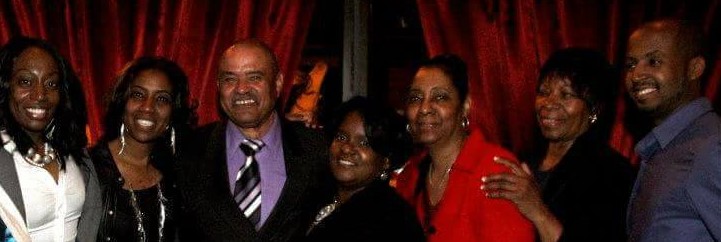
The Virginia Woman at the Foundation of Protecting Patient Autonomy
By Dora Muhammad, Congregation Engagement Director, Health Equity Program Manager
PHOTO CAPTION: Dora Muhammad with four granddaughters of Mrs. Henrietta Lacks and family at the 2017 symposium, “Issues of Blood: Rights & Responsibilities – An Evening Dialogue on Surviving Cervical Cancer, Preventive Care and the Legacy of Mrs. Henrietta Lacks.”
In 2013, the National Institute of Health entered into an agreement with members of the family of Mrs. Henrietta Lacks to set protocols for its distribution of her cells and appointed two members to a working group with the decision-making power to approve research requests to use their matriarch’s genetic blueprint. Dubbed in the medical field as HeLa cells (the first two letters of her first and last names combined), they are the most widely used human cells in medical research today.
Among the many crucial contributions made to medical research, HeLa cells have been instrumental in developing the polio vaccine, advancing treatments for cancer and other infections like HIV and Ebola, and improving techniques for in vitro fertilization. Between 1953 to 2018, over 110,000 publications utilized her cells. Yet, for more than 20 years, the identity of a Black woman’s cells as the source of medical innovations remained completely hidden. Her family did not learn of it until 1975. Henrietta Lacks was born in Roanoke and grew up on her family’s tobacco farm in Clover. She later moved to Maryland in her twenties after she married. In 1951, she was diagnosed with cervical cancer at John Hopkins Hospital in Baltimore. The mother of five died a couple months later at the age of 31.
She did not know that her cell samples obtained from a tissue biopsy during her cancer treatments were sent to a nearby research lab. Her cells were not only the first human cells to survive and replicate outside of the body indefinitely, but they doubled every 24 hours. While her family still fights for restitution and compensation for her cells’ use and profitmaking, the legacy of Mrs. Henrietta Lacks has propelled one of the fundamental principles of modern bioethics – patient autonomy.
Laws to protect patient privacy and respect patient rights continually try to keep pace with clinical technology. The field of bioethics opened up during the ‘70s but it was not until 1991 with the passing of The Common Rule that a definition of a “human subject” and a requirement of informed consent and oversight of an Internal Review Board to obtain research data from a human subject was standardized.
I stumbled across the bioethical impact of Mrs. Henrietta Lacks while watching an episode of Law & Order with a plot that involved such detailed medical mischief that I instinctively knew it was based on a true story. A simple internet search evolved into research because I was deeply moved as a survivor of cervical cancer. What I learned formed a core advocacy push in my women’s rights nonprofit and fueled my creation of “Let’s Be Clear” – a public education campaign to raise awareness of cervical cancer and increase Pap smear screenings in the U.S. and the Caribbean aimed at curbing the steady rise of preventable deaths.
The campaign launch culminated in a symposium, “Issues of Blood: Rights & Responsibilities – An Evening Dialogue on Surviving Cervical Cancer, Preventive Care and the Legacy of Mrs. Henrietta Lacks.” The event’s special guests were the granddaughters of Mrs. Henrietta Lacks, who joined us to honor her legacy and share their struggle for justice.
Equally vital to the agenda were John Hopkins representatives and program managers of cervical cancer screening programs in Maryland, D.C., and Virginia who provided local facts and resources. For we must center our advocacy work with a clear understanding of past injustices while connecting to current resources and evolving efforts of redress. The past provides the context and shapes the contour of the justice we seek as advocates, while we work to amplify potential policy changes to better governmental systems and society.
So, I hope you will join me and the VICPP Greater Prince William Chapter on Saturday, May 15 for “Bioethics & The Beloved Community – A symposium on protecting humanity, earning trust, and engaging people of faith.” Two of the medical researchers speaking hold a Master of Divinity and will bring a unique perspective to VICPP’s work as faith-based advocates of health equity. Joined by one of the leading COVID-19 researchers at George Mason University, the panel will collectively share a transformative outlook on the paradigm of bioethics that can be elevated and realized through the work of our faith voices.
